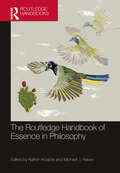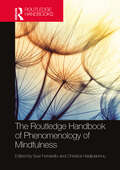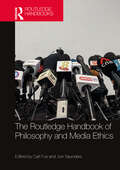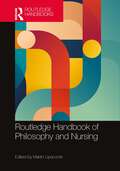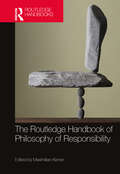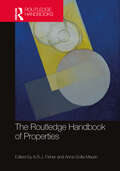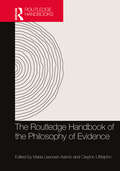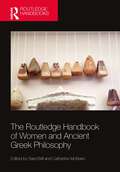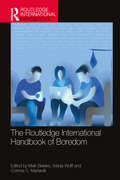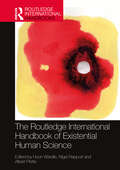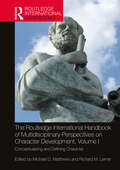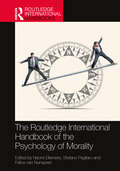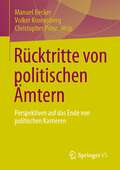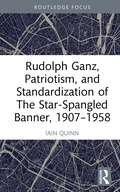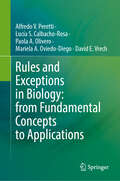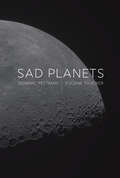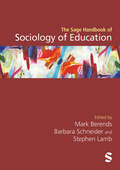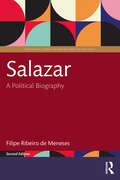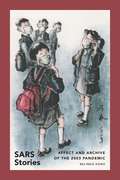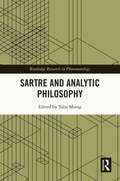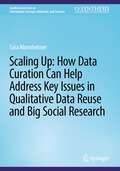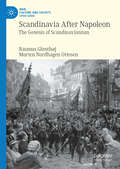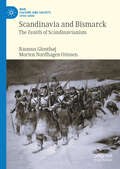- Table View
- List View
The Routledge Handbook of Essence in Philosophy (Routledge Handbooks in Philosophy)
by Kathrin Koslicki Michael J. RavenEssences have been assigned important but controversial explanatory roles in philosophical, scientific, and social theorizing. Is it possible for the same organism to be first a caterpillar and then a butterfly? Is it impossible for a human being to transform into an insect like Gregor Samsa does in Kafka’s The Metamorphosis? Is it impossible for Lot’s wife to survive being turned into a pillar of salt? Traditionally, essences (or natures) have been thought to help answer such central questions about existence, identity, persistence, and modality. These questions are not only of great philosophical interest, they also are of great interest to society at large.This Handbook surveys the state of the art on essence. Core issues about essence are discussed in 33 chapters, all of them written exclusively for this volume by leading experts. They are organized into the following four major parts, each with its own introduction that provides a summary and comparison of the part’s chapters: History Essence and Essentialisms: Themes and Variations Applications Anti-Essentialist Challenges. The volume is accessible enough for students while also providing enough details to make it a valuable reference for researchers.While the notion of essence has been targeted for sustained criticisms since antiquity, recent work has renewed interest in the topic. This Handbook explains and synthesizes much of this current interest, placing essence within its historical context and drawing connections to many contemporary areas of philosophy as well as to scholarly work in other disciplines. With cross-references in each chapter and a comprehensive index, The Routledge Handbook of Essence in Philosophy is a useful resource and essential reading for anyone, whether in or out of academic philosophy, seeking clarification on one of philosophy’s most distinctive and notorious notions.
The Routledge Handbook of Phenomenology of Mindfulness (Routledge Handbooks in Philosophy)
by Susi Ferrarello Christos HadjioannouThe Routledge Handbook of Phenomenology of Mindfulness brings together two schools of thought and practice that – despite rarely being examined jointly – provide an incredibly fruitful way for exploring thinking, the mind, and the nature and practice of mindfulness. Applying the concepts and methods of phenomenology, an international team of contributors explore mindfulness from a variety of different viewpoints and traditions. The handbook’s 35 chapters are divided into seven clear parts: Mindfulness in the Western Traditions Mindfulness in the Eastern Traditions Mindfulness, Ethics, and Well-Being Mindfulness, Time, and Attention Mindfulness and Embodiment Applications: Mindfulness in Life Conclusion: Mindfulness and Phenomenology? Within these sections, a rich array of topics and themes are explored, ranging from Stoicism and the origins of mindfulness in Buddhism and eastern thought to meditation, self-awareness, the body and embodiment, and critiques of mindfulness. Additionally, the book delves into the ways the ideas of leading phenomenological thinkers, including Heidegger, Merleau-Ponty, and Levinas, can contribute to understanding the relationship between phenomenology and mindfulness. A valuable resource for those researching phenomenology and applications of phenomenology, this handbook will also be of great interest to students and practitioners of mindfulness in areas such as counseling and psychotherapy.
The Routledge Handbook of Philosophy and Media Ethics (Routledge Handbooks in Applied Ethics)
by Carl Fox Joe SaundersThe media informs, entertains, and connects us. It is woven into the fabric of politics. Its increasing immediacy has become an inescapable feature of almost everybody’s life. We are, at the same time, subject to the media and participants in it. The ethical questions it raises have never been more urgent. Trust is in short supply, but we need to share information while dealing with problems like misinformation, disinformation, and echo chambers. And what responsibilities fall on the state, and on other actors such as artists, advertisers, and social media users, as we reckon with endemic problems like racism, sexism, and classism? The Routledge Handbook of Philosophy and Media Ethics is an outstanding survey and assessment of this vitally important field. Comprising thirty chapters written by an international team of contributors, the Handbook is divided into five parts: • Freedom of Speech, Privacy, and Censorship• The News Media• Broadening the Scope: Giving Other Aspects of the Media their Due• Justice, Power, and Representation• Vice and Virtue Online The Routledge Handbook of Philosophy and Media Ethics is essential reading for students and researchers in philosophy, media and communication studies, politics, and law, as well as practising media professionals and journalists.
Routledge Handbook of Philosophy and Nursing
by Martin LipscombPhilosophy offers a means of unpacking and grappling with important questions and issues relevant to nursing practice, research, scholarship, and education. By engaging in these discussions, this Handbook provides a gateway to new understandings of nursing. The Handbook, which is split loosely into seven sections, begins with a foundational chapter exploring philosophy’s relationship to and with nursing and nursing theory. Subsequent sections thereafter examine a wide range of philosophic issues relevant to nursing knowledge and activity. Philosophy and nursing, philosophy and science, nursing theory. Nursing’s ethical dimension is described. Philosophic questions concerning patient care are investigated. Socio-contextual and political concerns relevant to nursing are unpacked. Contributors tackle difficult questions confronting nursing. Difficulties around speech, courage, and race/otherness are discussed. Philosophic questions pertaining to scholarship, research, and technology are addressed. International in scope, this volume provides a vital reference for all those interested in thinking about nursing, whether students, practitioners, researchers, or educators.
The Routledge Handbook of Philosophy of Responsibility (Routledge Handbooks in Philosophy)
by Maximilian KienerThe philosophical inquiry of responsibility is a major and fast-growing field. It not only features questions around free will and moral agency but also addresses various challenges in the social, institutional, and legal contexts in which people are being held responsible. The Routledge Handbook of Philosophy of Responsibility is an outstanding survey and exploration of these issues. Comprised of forty-one chapters by an international team of contributors, the Handbook is divided into three clear parts – on the history, the theory, and the practice of responsibility – within which the following key topics are examined: responsibility and wrongdoing responsibility and determinism the scope of responsibility the responsibility of individuals within society the concepts of responsibility the conditions and challenges of responsibility the practices of being and holding responsible the ethics and politics of responsibility responsibility in the law. Including suggestions for further reading at the end of each chapter, The Routledge Handbook of Philosophy of Responsibility provides an extremely useful guide to the topic. It will be valuable reading for students and researchers in philosophy and applied ethics, as well as for those in related fields such as politics, law, and policymaking.
The Routledge Handbook of Properties (Routledge Handbooks in Philosophy)
by Fisher, A.R.J. Anna-Sofia MaurinPhilosophical questions regarding both the existence and nature of properties are ubiquitous in ordinary life, the sciences, and philosophical theorising. In philosophy, it is one of the oldest topics discussed in various intellectual traditions – East and West – reaching back to Plato and Aristotle. Today, in the analytic tradition, properties continue to be a core area of study and research. The Routledge Handbook of Properties is an outstanding reference source to this perennial topic and is the first major volume of its kind. It contains forty specially commissioned chapters written by an international team of expert contributors, and is divided into nine clear parts: Methodology and Metaontology Distinctions Realism about Universals Nominalism Trope Theory Properties in Causation, Time, and Modality Properties in Science Properties in Language and Mind Properties in the Normative Realm, the Social World, and Aesthetics The Routledge Handbook of Properties is essential reading for anyone studying and researching metaphysics, metametaphysics, and ontology, and will also be of interest to those in closely related areas such as philosophy of science, philosophy of language, philosophy of mind, ethics, and aesthetics.
The Routledge Handbook of the Philosophy of Evidence (Routledge Handbooks in Philosophy)
by Maria Lasonen-Aarnio Clayton LittlejohnWhat one can know depends on one’s evidence. Good scientific theories are supported by evidence. Our experiences provide us with evidence. Any sort of inquiry involves the seeking of evidence. It is irrational to believe contrary to your evidence. For these reasons and more, evidence is one of the most fundamental notions in the field of epistemology and is emerging as a crucial topic across academic disciplines. The Routledge Handbook of the Philosophy of Evidence is an outstanding reference source to the key topics, problems, and debates in this exciting subject and is the first major volume of its kind. Comprising forty chapters by an international team of contributors the handbook is divided into six clear parts: The Nature of Evidence Evidence and Probability The Social Epistemology of Evidence Sources of Evidence Evidence and Justification Evidence in the Disciplines The Routledge Handbook of the Philosophy of Evidence is essential reading for students and researchers in philosophy of science and epistemology, and will also be of interest to those in related disciplines across the humanities and social sciences, such as law, religion, and history.
The Routledge Handbook of the Philosophy of Evidence (Routledge Handbooks in Philosophy)
by Maria Lasonen-Aarnio Clayton LittlejohnWhat one can know depends on one’s evidence. Good scientific theories are supported by evidence. Our experiences provide us with evidence. Any sort of inquiry involves the seeking of evidence. It is irrational to believe contrary to your evidence. For these reasons and more, evidence is one of the most fundamental notions in the field of epistemology and is emerging as a crucial topic across academic disciplines.The Routledge Handbook of the Philosophy of Evidence is an outstanding reference source to the key topics, problems, and debates in this exciting subject and is the first major volume of its kind. Comprising forty chapters by an international team of contributors the handbook is divided into six clear parts: The Nature of Evidence Evidence and Probability The Social Epistemology of Evidence Sources of Evidence Evidence and Justification Evidence in the Disciplines The Routledge Handbook of the Philosophy of Evidence is essential reading for students and researchers in philosophy of science and epistemology, and will also be of interest to those in related disciplines across the humanities and social sciences, such as law, religion, and history.
The Routledge Handbook of Women and Ancient Greek Philosophy (Routledge Handbooks in Philosophy)
by Sara Brill Catherine McKeenThe Routledge Handbook of Women and Ancient Greek Philosophy is an essential reference source for cutting-edge scholarship on women, gender, and philosophy in Greek antiquity. The volume features original research that crosses disciplines, offering readers an accessible guide to new methods, new sources, and new questions in the study of ancient Greek philosophy and its multiple afterlives. Comprising 40 chapters from a diverse international group of experts, the Handbook considers questions about women and gender in sources from Greek antiquity spanning the period from 7th c. BCE to 2nd c. BCE, and in receptions of Greek antiquity from the Roman Imperial period, through the European Renaissance to the current day. Chapters are organized into five major sections: I. Early Greek antiquity – including Sappho, Presocratic philosophy, Sophists, and Greek tragedy – 700s–400s BCEII. Classical Greek antiquity – including Aeschines, Plato, and Xenophon – 400s–300s BCEIII. Late Classical Greek to Hellenistic antiquity – including Cyrenaics, Cynics, the Hippocratic corpus, and Aristotle – 300s–200s BCEIV. Late Greek antiquity to Roman Imperial period – including Pythagorean women, Stoics, Pyrrhonian Skeptics, and late Platonists – 200s BCE to 700s CEV. Later receptions – including Shakespeare, the European Renaissance, Anna Julia Cooper, W.E.B. DuBois, Jane Harrison, Sarah Kofman, and Toni MorrisonThe Routledge Handbook of Women and Ancient Greek Philosophy is a vital resource for students and scholars in philosophy, Classics, and gender studies who want to gain a deeper understanding of philosophy’s rich past and explore sources and questions beyond the traditional canon. The volume is a valuable resource, as well, for students and scholars from history, humanities, literature, political science, religious studies, rhetorical studies, theatre, and LGBTQ and sexuality studies.
The Routledge International Handbook of Boredom (Routledge International Handbooks)
by Maik Bieleke Wanja Wolff Corinna S. MartarelliThis comprehensive text is a unique handbook dedicated to research on boredom. The book brings together leading contributors from across three continents and numerous fields to provide an interdisciplinary exploration of boredom, its theoretical underpinnings, its experiential properties, and the applied contexts in which it occurs.Boredom is often viewed as a mental state with little utility, though recent research suggests that it can be a powerful motivator of human behavior that shapes our actions in many ways. The book examines boredom from a range of perspectives and is comprised of three parts. Part I delves into the theoretical approaches to boredom, presenting methods for its measurement, explaining when and why boredom occurs, and scrutinizing the impact it has on our behavior. Part II focuses on the psychological and neural properties of boredom and its associations with a multitude of mental and interpersonal processes, such as self-control, mind-wandering, flow, and aggression. Part III presents boredom in practical contexts like school and work, and sheds light on its role for health-related behaviors, psychosocial well-being, and aesthetic experiences. The book concludes by summarizing the state of boredom research, identifying promising areas for future research, and providing directions for how research on boredom can be advanced. As the authoritative book on boredom, this handbook is an essential resource for students and researchers of psychology, sociology, education, sport science, and computer science.
The Routledge International Handbook of Existential Human Science (Routledge International Handbooks)
by Huon Wardle Nigel Rapport Albert PietteThis volume is the first handbook to explore existentialism as epistemology and method. Transdisciplinary in scope, it considers the nature of human subjectivity and how human experience ought to be studied, examining the connections that exist between the individual’s imagining of the world and their everyday practice within it. With attention to the question of whether humans are ultimately alone in their self-knowledge or whether what they know of themselves is constructed in common with others, it enables the reader to recognize core questions that frame the methods and orientation of an existential inquiry. In addition to historical exposition, it offers a variety of chapters from around the world that explore the diverse global spaces for, and different types of, existential focus and discussion, thus questioning the view that the existential "problem" may be singularly a matter for the post-enlightenment West. The fullest and most comprehensive survey to date of what human beings can and should make of themselves, The Routledge International Handbook of Existential Human Science will appeal to scholars across the humanities and social sciences with interests in anthropology, sociology, philosophy, and research methods.
The Routledge International Handbook of Multidisciplinary Perspectives on Character Development, Volume I: Conceptualizing and Defining Character (Routledge International Handbooks)
by Michael D. Matthews Richard M. LernerDrawing from philosophy, religion, biology, behavioral and social sciences, and the arts, The Routledge International Handbooks of Multidisciplinary Perspectives on Character Development, Volumes I and II, present cutting-edge scholarship about the concept of character across the life span, the developmental and contextual bases of character, and the key organizations of societal sectors, within and across nations, that promote character development in individuals, families, and communities.This first volume, Conceptualizing and Defining Character, explores the foundations of the field by providing an array of interdisciplinary approaches to character development, including economics, education, law, literature, military science, philosophy, and many more. With contributions from international experts, Volume I brings together cutting-edge research and discusses instances of character development, including civic character, courage, fairness, forgiveness, gratitude, morality, tolerance, and thankfulness.This comprehensive publication is an essential reference for researchers and graduate students in behavioral sciences, biology, philosophy, theology, and economics, as well as practitioners leading or evaluating character education or character development programs around the world.Find Volume II: Moderators, Threats, and Contexts here: www.routledge.com/9781032172453
The Routledge International Handbook of the Psychology of Morality (Routledge International Handbooks)
by Naomi Ellemers Stefano Pagliaro Félice Van NunspeetThis cutting-edge handbook examines moral psychology and behavior, uncovering layers of human morality through a comprehensive overview of topics and approaches. Featuring an array of expert international contributors, the book addresses five key themes: moral reasoning, moral judgments, moral emotions, moral behavior and moral self-views. Each section includes empirical chapters that address these themes at the intrapersonal, interpersonal, intragroup or intergroup level. Each section starts with a reflective chapter from a leading scholar in this field of study who shares their personal vision on key issues and future developments. Drawing on emerging research and featuring real-world examples, the book offers a deeper understanding of the social psychological factors that shape our moral behavior and how this plays out in our daily lives. The Routledge International Handbook of the Psychology of Morality will be essential reading for academics and students in social psychology, the psychology of morality, business ethics and related areas. It will also be a compelling resource for legal and HR professionals, policy makers and anyone interested in understanding the complex and multi-faceted nature of human morality.
Rücktritte von politischen Ämtern: Perspektiven auf das Ende von politischen Karrieren
by Manuel Becker Volker Kronenberg Christopher PrinzPolitikwissenschaftliche und zeitgeschichtliche Untersuchungen zu den Karrieren deutscher Spitzenpolitiker*innen beschäftigten sich bislang vor allem mit deren Aufstieg und weniger mit dem Ende von politischen Laufbahnen. Aus welchen Gründen treten Politiker*innen aus dem Amt zurück? Was sind die Hintergründe, Motive und Konsequenzen einer solchen Entscheidung? Müssen Rücktritte zwingend Resultat eines Scheiterns sein oder kann es auch „erfolgreiche“ Rücktritte geben? In diesem Band werden theoretische Grundlagen der Rücktrittsforschung aus rechtlicher und politikwissenschaftlicher Perspektive erarbeitet, Rücktrittskulturen in unterschiedlichen Ländern vergleichend untersucht sowie verschiedene Fallbeispiele in ihren spezifischen Einzelfallbedingungen unter die Lupe genommen.
Rudolph Ganz, Patriotism, and Standardization of The Star-Spangled Banner, 1907-1958
by Iain QuinnThis book examines the succession of events toward the potential standardization of the music for “The Star-Spangled Banner” from an initial letter to President Roosevelt in 1907 to the 1958 congressional hearings on the National Anthem, and the later work of the Swiss-Born American pianist, Rudolph Ganz. These events took place across five decades when a culture of public patriotism was especially pronounced for immigrant musicians. This book contextualizes the complementary experiences of a leading immigrant musician, Ganz, who successfully navigated the world of public patriotism while pursuing the realization of a standardized version. The materials are discussed through the lens of the performance practice. The legacy of standardization has not previously been examined. The response and actions of an immigrant, Ganz, in a culture of necessary patriotism for foreign-born artists shed important new light on this topic. It demonstrates the challenges, fears, and cultural expectations regarding the standardization of an important patriotic work.
Rules and Exceptions in Biology: from Fundamental Concepts to Applications
by Alfredo V. Peretti Lucía S. Calbacho-Rosa Paola A. Olivero Mariela A. Oviedo-Diego David E. VrechThis is the first book to cover and explore the rules and exceptions in biology. It presents past and current perspectives on the subject and discusses the various situations of transition from rule to exception and vice versa. In doing so, the book fills a gap in the scientific literature and stimulates useful and valuable discussions among researchers working in biology worldwide. The chapters begin with a theoretical framework, followed by the main topic(s) or question(s), and a summary of previous work on the topic. Examples are discussed, with concluding remarks and suggestions for future research. A section with key concepts is included at the end of each chapter, allowing the reader to jump directly to the most important findings or observations. Each chapter is written to be used as a reference by graduate students and professionals from a variety of scientific disciplines (e.g. behavior, ecology, evolution, and systematics).
Sad Planets
by Dominic Pettman Eugene Thacker“Everything is sad,” wrote the Ancient poets. But is this sadness merely a human experience, projected onto the world, or is there a gloom attributable to the world itself? Could the universe be forever weeping the “tears of things”? In this series of meditations, Dominic Pettman and Eugene Thacker explore some of the key “negative affects” – both eternal and emergent – associated with climate change, environmental destruction, and cosmic solitude. In so doing they unearth something so obvious that it has gone largely unnoticed: the question of how we should feel about climate change. Between the information gathered by planetary sensors and the simple act of breathing the air, new unsettling moods are produced for which we currently lack an adequate language. Should we feel grief over the loss of our planet? Or is the strange feeling of witnessing mass extinction an indicator that the planet was never “ours” to begin with? Sad Planets explores this relationship between our all-too-human melancholia and a more impersonal sorrow, nestled in the heart of the cosmic elements.Spanning a wide range of topics – from the history of cosmology to the “existential threat” of climate change – this book is a reckoning with the limits of human existence and comprehension. As Pettman and Thacker observe, never before have we known so much about the planet and the cosmos, and yet never before have we felt so estranged from that same planet, to say nothing of the stars beyond.
The Sage Handbook of Sociology of Education
by Mark Berends Barbara Schneider Stephen LambThe Sage Handbook of Sociology of Education is an international and comprehensive groundbreaking text that serves as a touchstone for researchers and scholars interested in exploring the intricate relationships between education and society. Leading sociologists from five different continents examine major topics in sociology from a global perspective. This timely, thought-provoking Handbook features contributions from leading and emerging sociology scholars, who provide their own cultural and historical perspectives on diverse—yet universal—topics; these include educational policy, social stratification, and cross-national research. 39 Chapters delve into the pressing issues faced by our global society, such as the effects of residential mobility on educational outcomes, gender and ethnic inequalities, and the impact of COVID-19 on early childhood education. Readers will gain a multifaceted view of the contours of educational inequality, from various international perspectives and focusing on country differences, as well as recommendations for expanding the practices, programs, and policies that could reduce the rising tide of inequities—especially for populations most at risk. This Handbook offers rich, diverse perspectives on the interplay between education, social inequality, and human rights around the world, making it an invaluable resource for students, researchers, and practitioners across a range of fields, including sociology, education, and social policy. PART 1: Education and Persistent Inequality PART 2: Social & Family Contexts PART 3: Schools & Educational Policy PART 4: Neighborhoods & Community PART 5: Education & Innovation in a Global Context
The Sage Handbook of Sociology of Education
by Mark Berends Barbara Schneider Stephen LambThe Sage Handbook of Sociology of Education is an international and comprehensive groundbreaking text that serves as a touchstone for researchers and scholars interested in exploring the intricate relationships between education and society. Leading sociologists from five different continents examine major topics in sociology from a global perspective. This timely, thought-provoking Handbook features contributions from leading and emerging sociology scholars, who provide their own cultural and historical perspectives on diverse—yet universal—topics; these include educational policy, social stratification, and cross-national research. 39 Chapters delve into the pressing issues faced by our global society, such as the effects of residential mobility on educational outcomes, gender and ethnic inequalities, and the impact of COVID-19 on early childhood education. Readers will gain a multifaceted view of the contours of educational inequality, from various international perspectives and focusing on country differences, as well as recommendations for expanding the practices, programs, and policies that could reduce the rising tide of inequities—especially for populations most at risk. This Handbook offers rich, diverse perspectives on the interplay between education, social inequality, and human rights around the world, making it an invaluable resource for students, researchers, and practitioners across a range of fields, including sociology, education, and social policy. PART 1: Education and Persistent Inequality PART 2: Social & Family Contexts PART 3: Schools & Educational Policy PART 4: Neighborhoods & Community PART 5: Education & Innovation in a Global Context
Salazar: A Political Biography (Routledge Studies in Fascism and the Far Right)
by Filipe Ribeiro de MenesesSalazar: A Political Biography is the definitive biography of the longstanding Portuguese dictator. António de Oliveira Salazar entered the government of Portugal when Herbert Hoover was president and ended his political career at the end of the Johnson administration. He remained in power for forty years (1928–1968), one of the longest tenures in modern history. Unlike the other ‘great dictators’ of the twentieth century, Salazar, an academic, immersed himself in the minutiae of government and administration, maintaining a prodigious work rate until illness forced his retirement. He successfully managed his country’s finances despite the impact of the Great Depression, imposing a harsh policy of austerity. He then preserved Portugal’s neutrality during the Second World War, ultimately favouring Great Britain and the United States. But Salazar was at heart an extremely conservative, even reactionary statesman. He relied on secrecy and a police state to maintain the order which, he believed, was necessary to control progress. Rejecting the anti-colonialist movements in Asia and Africa, he plunged Portugal into a series of wars in Africa it could ill afford. Fully revised and updated throughout, this remains the authoritative biography of a key Portuguese political leader who was a significant presence in twentieth-century politics. This book will be of interest to historians of the far right, international diplomacy and Portugal.
SARS Stories: Affect and Archive of the 2003 Pandemic (Sinotheory)
by Belinda KongIn SARS Stories, Belinda Kong delves into the cultural archive of the 2003 SARS pandemic, examining Chinese-language creative works and social practices at the epicenters of the outbreak in China and Hong Kong. As the COVID-19 pandemic has highlighted issues of anti-Asian racism and sinophobia, Kong traces how Chinese people navigated the SARS pandemic and created meaning amid crisis through cultures of epidemic expression. From sentimental romances and Cantopop songs to raunchy sex comedies and crowdsourced ghost tales, unexpected and minor genres and creators of Chinese popular culture highlight the resilience and humanity of those living through the pandemic. Rather than narrating pandemic life in terms of crisis and catastrophe, Kong argues that these works highlight Chinese practices of community, care, and love amid disease. She also highlights the persistence of orientalism in anglophone accounts of SARS index patients and global reporting on COVID-era China. Kong shows how the Chinese experiences of living with SARS can reshape global feelings toward pandemic social life and foster greater fellowship in the face of pandemics.
Sartre and Analytic Philosophy (Routledge Research in Phenomenology)
by Talia MoragThis book explores the relevance of Sartre’s work for various areas in contemporary philosophy, including the imagination, philosophy of language, skepticism, social ontology, logic, film, practical rationality, emotions, and psychoanalysis. Unlike other collections focused on Sartre, this book is not intended as a book of Sartre scholarship or interpretation. The volume’s contributors, trained in analytic philosophy, engage with Sartre’s work in new refreshing ways, which does not require seeing him as primarily belonging to the continental philosophical traditions of phenomenology or existentialism. Instead, this book aims to make available and fruitfully explore the unheralded insights of Sartre, to creatively re-appropriate or rationally reconstruct certain fruitful ideas or approaches of Sartre and confront them with or make them available to contemporary philosophy in general. Sartre thereby emerges from this book as a versatile philosopher with a stake in a large variety of philosophical concerns. Sartre and Analytic Philosophy will appeal to Sartre scholars who are interested in his relevance to contemporary philosophical debates, as well as philosophers who are interested in exploring new ways of doing philosophy, which are neither stereotypically “analytic” nor “continental.”
Scaling Up: How Data Curation Can Help Address Key Issues in Qualitative Data Reuse and Big Social Research (Synthesis Lectures on Information Concepts, Retrieval, and Services)
by Sara MannheimerThis book explores the connections between qualitative data reuse, big social research, and data curation. A review of existing literature identifies the key issues of context, data quality and trustworthiness, data comparability, informed consent, privacy and confidentiality, and intellectual property and data ownership. Through interviews of qualitative researchers, big social researchers, and data curators, the author further examines each key issue and produces new insights about how domain differences affect each community of practice’s viewpoints, different strategies that researchers and curators use to ensure responsible practice, and different perspectives on data curation. The book suggests that encouraging connections between qualitative researchers, big social researchers, and data curators can support responsible scaling up of social research, thus enhancing discoveries in social and behavioral science.
Scandinavia After Napoleon: The Genesis of Scandinavianism (War, Culture and Society, 1750–1850)
by Rasmus Glenthøj Morten Nordhagen OttosenThis book explores the intellectual grounds of Scandinavianist ideology and its political development into a national unification movement. Denmark, Norway and Sweden were nearly annihilated during the Napoleonic Wars. The lesson learned was that survival was a matter of size. Whereas their union of 1814 offered Sweden-Norway geostrategic security tempered by fear of Russia, Denmark was the biggest territorial loser of the Napoleonic Wars and faced separatism connected to German nationalism in the duchies of Schleswig and Holstein. This evolved into a national conflict that threatened Denmark’s survival as a nation. Meanwhile, a new generation of Danes, Swedes and Norwegians had come to regard kindred language, culture and religion as a case for Scandinavian union that could offer protection against Russia and Germany. When the European revolutions of 1848 unleashed the First Schleswig War, the influence of Scandinavianism was such that it nearly turned into a Scandinavian war of unification.
Scandinavia and Bismarck: The Zenith of Scandinavianism (War, Culture and Society, 1750–1850)
by Rasmus Glenthøj Morten Nordhagen OttosenThis book accounts for Scandinavian unification efforts in a time of great upheaval. The ideological repercussions of the European revolutions of 1848-1849 and the Crimean War (1853-1856) transformed both the international political system and nationalism into more ‘realist’ types. The First Schleswig War (1848-1851) having nearly turned into one of Scandinavian unification, the influence of Scandinavianism extended into the Danish, Swedish and Norwegian courts, cabinets and parliaments, attracting interest from the great powers. The Crimean War offered another window of opportunity for Scandinavian unification, before the Danish-German conflict over the duchies of Schleswig and Holstein nearly united Scandinavia upon the outbreak of the Second Schleswig War in 1864. The ultimate failure of Scandinavianism in its unification efforts was not predetermined, although historiography has made it appear as such. Napoleon III, Cavour and Bismarck all actively contributed to plans for Scandinavian unification, the latter even declaring himself as “very strongly Scandinavian”.
